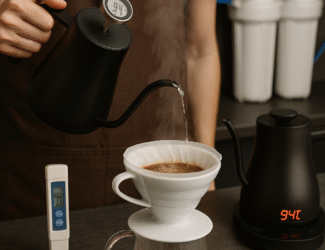
The Impact of Artificial Intelligence on the Coffee Industry
Artificial Intelligence (AI) is revolutionizing industries across the globe, and the coffee sector is no exception. The coffee industry, with its rich history and complex supply chain, is ripe for transformation through AI. This report explores how AI is poised to transform various aspects of the coffee industry, from bean selection to customer experience.
Key Areas of AI Application in Coffee:
a) Bean Selection and Quality Control
AI-powered computer vision systems, such as those developed by Demetria, are revolutionizing the bean selection process. These systems use high-resolution cameras and advanced image processing algorithms to analyze beans for defects, size, and color consistency, processing thousands of beans per minute, far outpacing human inspectors.
Machine learning models are being trained on vast datasets of bean characteristics, including origin, altitude, soil type, and processing method. These models can predict bean quality and flavor profiles with increasing accuracy. This not only ensures higher quality but also allows for more precise blending to achieve desired taste profiles. For instance, companies like IBM have developed AI systems that predict the quality and yield of coffee crops, helping farmers make informed decisions to improve productivity and quality.
b) Roasting and Brewing Optimization
In roasting, AI systems like Cropster Roast integrate with sensors that monitor temperature, time, air flow, and even the sound of beans cracking. By analyzing this data in real-time and comparing it with ideal roasting profiles, AI can make micro-adjustments throughout the roasting process, leading to more consistent results and the development of new roasting profiles for unique flavor outcomes. Companies like Roest have developed AI-powered coffee roasters that offer precise control over the roasting process.
For brewing, AI is being incorporated into both commercial and high-end consumer machines. These systems can adjust variables like water temperature, pressure, and flow rate based on the specific beans being used. Some advanced systems, such as those by Nespresso, are even beginning to incorporate user feedback to fine-tune brewing parameters to individual tastes over time. AI-driven brewing systems like the ones used by Atomo Coffee can mimic the taste profiles of traditional coffee by analyzing the molecular composition of beans and adjusting brewing methods accordingly.
c) Personalized Customer Experiences
AI-driven recommendation systems, such as those used by Nespresso, are becoming increasingly sophisticated. By analyzing a customer’s purchase history, flavor preferences, and even factors like the time of day or weather, these systems can suggest coffee blends or brewing methods tailored to individual tastes.
Natural language processing enables advanced chatbots and virtual assistants, like Starbucks’ My Starbucks Barista, to handle complex orders, answer detailed questions about coffee origins and flavor profiles, and provide brewing tips. As these systems improve, they are able to provide more nuanced and helpful interactions, enhancing the overall customer experience. For example, AI-powered chatbots can engage customers in real-time, offering personalized recommendations and support.
Benefits and Challenges
Benefits:
- Improved Consistency: AI’s ability to maintain precise control over roasting and brewing parameters ensures a more consistent product, which is particularly valuable for large chains like Starbucks, where consistency across locations is crucial.
- Enhanced Efficiency: Beyond just sorting beans and managing inventory, AI can optimize supply chains, predict demand to reduce waste, and assist in staff scheduling based on predicted busy periods.
- Data-Driven Insights: AI can analyze data from across the entire coffee production and sales process, uncovering insights into consumer preferences, helping identify emerging trends, and assisting in developing new products. For instance, AI can identify seasonal preferences for certain coffee blends and help companies tailor their offerings accordingly.
- Sustainability: AI can help reduce waste, optimize resource use, and support more sustainable farming practices through precision agriculture techniques. AI can monitor soil health, weather patterns, and crop conditions to provide actionable insights for sustainable farming practices.
Challenges:
- Implementation Costs: The initial investment can be substantial, especially for smaller businesses. This includes the cost of AI systems themselves and the infrastructure needed to support them, such as sensors, data storage, and high-speed internet connections.
- Technical Expertise: Coffee businesses may need to hire data scientists and AI specialists, roles traditionally not associated with the industry. Training existing staff to work alongside AI systems effectively is also necessary.
- Balancing Automation with Craft: There is a risk of losing the ‘human touch’ that many coffee enthusiasts value. Businesses need to find ways to use AI to enhance rather than replace the artisanal aspects of coffee making.
- Data Privacy Concerns: As AI systems collect more customer data to personalize experiences, businesses must ensure compliance with data protection regulations and maintain customer trust. Implementing robust data protection measures and transparency in data usage are essential to address these concerns.
Real-World Examples:
Starbucks
Starbucks’ “Deep Brew” AI initiative goes beyond just personalized marketing and inventory management. It’s being used to optimize store layouts based on customer flow analysis, predict equipment maintenance needs to prevent unexpected breakdowns, automate administrative tasks to free up staff for customer interactions, and analyze sales patterns to inform new product development. Deep Brew also helps in workforce management by predicting peak hours and scheduling staff accordingly.
Driftaway Coffee
Driftaway Coffee’s use of AI for personalization is particularly innovative. Customers receive tasting kits and provide feedback via an app. AI analyzes this feedback along with data on bean origins and processing methods, creating a unique “taste profile” for each customer. This profile is used to select and create custom blends for each subscriber, with the AI continuously learning and refining its recommendations based on ongoing feedback. This approach not only enhances customer satisfaction but also fosters a deeper connection between consumers and their coffee choices.
Future Outlook
AI is likely to play a crucial role in addressing climate change impacts on coffee farming. Predictive models could help farmers adapt to changing conditions and maintain crop quality. We may see the emergence of fully automated “coffee kiosks” in high-traffic areas, using AI to brew personalized cups of coffee without human intervention. AI could enable more direct relationships between consumers and coffee farmers, with systems providing detailed information about the exact origin of each cup, down to the specific plot of land. In home brewing, AI-enabled machines might replicate the exact taste of a coffee enjoyed at a café by analyzing the bean type and adjusting brewing parameters.
Additionally, AI could facilitate the development of new coffee products by analyzing market trends and consumer preferences. This could lead to the creation of unique blends and brewing methods that cater to evolving tastes. AI might also support initiatives for fair trade and ethical sourcing by ensuring transparency and traceability throughout the supply chain.
Conclusion
While AI promises significant advancements in efficiency, consistency, and personalization within the coffee industry, the challenge lies in balancing these technological innovations with the art and craft of coffee making. As the industry evolves, finding this balance will be crucial to satisfying both the demand for convenience and the appreciation for the human touch in coffee culture. The successful integration of AI in the coffee industry has the potential to enhance the consumer experience and create more sustainable and efficient practices throughout the supply chain. As AI technology advances, we can expect to see even more innovative applications that will reshape how we produce, prepare, and enjoy coffee.



